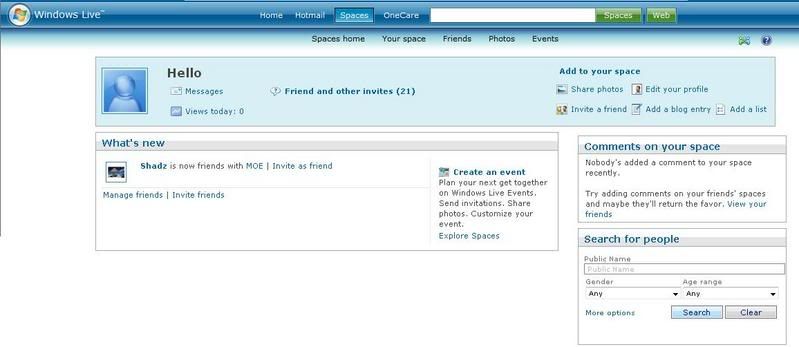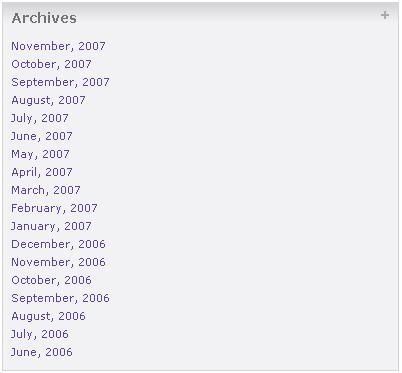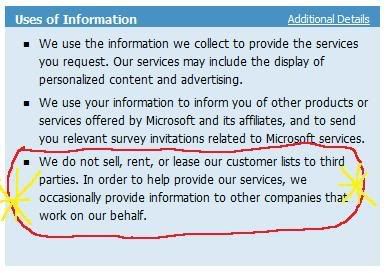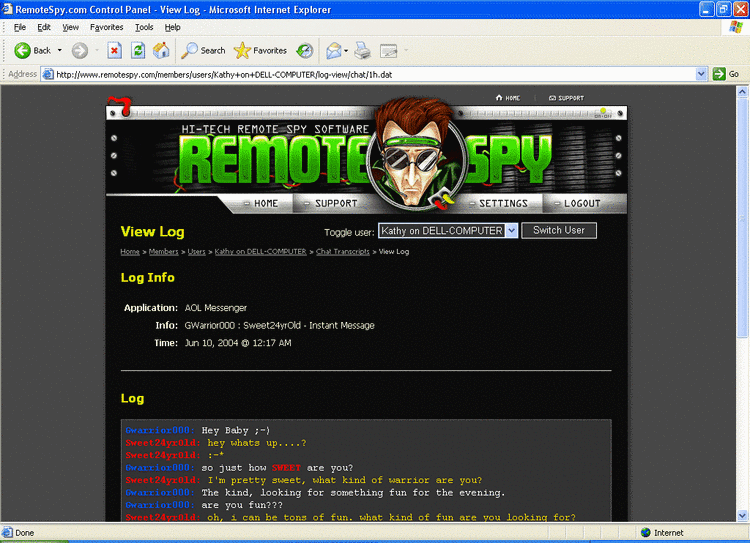Courses/Computer Science/CPSC 203/CPSC 203 2007Fall L04/CPSC 203 2007Fall L04 TermProjects/Case

a special investigation by Computer Science Investigators

Contents
Confidential Case: #845203-EZ
Case Profile
Initial Project Statement
The purpose of this investigation is to research and report the safety of Instant Messaging to the general public. Our Unit will be specifically studying the identity risks associated with "talking" online, a look into weather the many applications and add-ons enhance or jeopardize online safety, and how any MSN related conversations can be used legally and illegally in the Canadian Justice System.
Our key suspect is Windows Live Messenger, under the alias of: "MSN". Our investigation will come to a close with a case study into the life of a young girl, as we follow and track her first MSN experience.
Special Unit
Group Information
- Special Agent | Addie
- Special Agent | Maggie
- Undercover Agent | Jeremiah Charles
- IT Specialist | Jared
- Attorney at Law | Bhagya
Argument
With the evolution of online technology, people are beginning to regard the Internet as a pseudo-society. With the increasing use of Instant Messaging services, especially Windows Live Messenger (MSN), the gap between real-world strangers is closing faster than ever. Individuals can communicate with others on opposite sides of the world, thus bridging the gaps and creating the illusion of a community. However, what most people forget is that someone you meet on the Internet is no different from a stranger in the real world. The impression of a society makes people feel safer, and essentially, breaks down their otherwise secure barriers. People become more gullible and susceptible to myths being fed to them by their so-called online family, and are even willing to share information that would otherwise be considered private. Some even feel that they are comfortable enough with a person to meet them in person. MSN can be a wonderful tool, if used correctly, as it allows friends and family to keep in touch with each other. However, one must be careful to use it with discretion as there are many shady characters out there who choose to use this tool for all the wrong reasons.
MythBusters
We first begin our look into MSN by examining the many Myths associated with MSN, what we can and can't do on this wonderful communication tool.
1. A webcam stream is just between you and your chat partner
- Status: FALSE
- There are programs that your chat partner can download, allowing them to record your webcam sessions and do with it what they please (for example, post it up on the internet). Even if these programs didn’t exist, there are other alternatives. For example, the conversation could be video-taped or simply captured by using the “print screen” button on the computer. Also, remember that your chat partner may not be the only one present at the time of the conversation. Therefore, it is of the utmost importance that if you are ever going to involve yourself in a webcam session that is meant to be private, ensure that the person on the other end is someone you can trust completely. It is also important to remember that there are ways of intercepting webcam streams and msn conversations, which will not be elaborated upon for privacy purposes). Therefore, it would be in your best interest to avoid doing things that you would not want aired.
2. MSN will soon start charging for their instant messaging services unless you forward this email/sign this petition
- Status: FALSE
- There have been numerous emails floating around that MSN (and other services) will soon start charging for instant messaging services. Since “soon” has not happened for the past 9 years, which is around the time this email originally surfaced, it is safe to conclude that this is nothing more than a hoax. Initially targeted towards AOL users, the email has been adjusted several times to reflect new deadlines by which the petition must be signed. By 2001, MSN and Yahoo users began receiving this message as well. Not only have all three companies denied any such claims, this hoax is completely ridiculous mainly because of the negative impacts it would have on their respective businesses. Instant messaging continues to be a key component to MSN’s success; charging for such a service would simply cause otherwise loyal customers to switch to a different provider that offers the service for free.
3. Your MSN screen name has been added to the ‘Hacker’s List’
- Status: FALSE
- Yet another hoax that has been circulated through email, this one begins by claiming that your screen name has been added to the **** Hacker’s List. It then states that unless you resend this email to a specified number of people in the specified amount of time, your name will permanently remain on the hacker’s list. This is supposed to mean a variety of things such as; access to your credit card information, social insurance number, home address, etc. Thinking critically, one must realize that MSN does not possess such sensitive information as your SIN number. Furthermore, any information they do have about you would be more secure than is suggested in the email, after all, Microsoft is a multibillion dollar corporation.
4. If somebody called ****@hotmail.com adds you to msn, don’t accept. It’s a virus/hacker/three headed alien/etc
- Status: FALSE
- There are many possible reasons for the development of this hoax. It could simply be someone looking to exploit and expose the gullibility of humans, or merely the result of a personal vendetta. Whichever the case, this hoax has been around since 2000 and is constantly being revised to include a new email address, MSN screen name, personal web page, etc. In all that time, there has been nothing to prove that this claim has any truth to it, and its many different forms only serve to increase its questionability. Furthermore, none of the versions of this email have actually specified the virus, and none of the major-antivirus sites mention such a virus except to clarify that it is indeed a hoax. Additionally, it is impossible for an email address to be a virus, since some sort of file transfer must take place in order for a person’s computer to be infected.
MSN Applications
MSN began as MSN Messenger 1 which included only basic features. Things like plain text and a very simple contacts list. It then went through six more versions, each upgrading its content and features until it finally became Windows Live Messenger. This progression has brought many updates and add-ons to be made available for MSN.
Though most of us primaily use MSN for it's main purpose, instant messaging friends and family across the globe, some actually take note of the multiple features of Windows Live Messenger.
External Links on MSN
If you look at your Live Messenger Window you may notice several icons left of your contacts list. These icons serve many purposes.
![]()
Though in general, these icons may be useful to responsble adults, they can be harmful for the irresponible adult or children in general. MSN promoting links to websites such as internet dating can lead to young children wanting to experience it themselves and can easily do so provided the link is right in front of them.
YourSpace
There is also a feature called Your Space. This icon links you to a website similar to other social networking sites such as MySpace or Facebook. Everyone on your Windows Live list has access to this page and may divulge personal infromation you include on this page. Things such as phone numbers, addresses and where you're from can all be included on this page.

Included in YourSpace is a feature called "Archive." This is a history of all your activity on YourSpace going back as long as you've been a member and can be accessed by ANYONE on your MSN list.

Risks of Using YourSpace
YourSpace, like any other social networking website, has many safety risks including privacy barriers and confidentiality restrictions. Pictures posted, information given, and friends listed can all be accessed by someone you added to MSN thinking it would be harmless. If, by chance, you meet someone online and add them to MSN, (like you will soon see with Naomi) they instantly can view anything you have posted onto YourSpace.

Reading the privacy statement you may notice a example of hypocricy. They claim to not sell or lend and personal information to any third party, but then go to say that OCCASIONALLY they provide information to other companies that work for them. Though these "other companies" may not be considered third parties, they can include companies who advertise with MSN which include anyone from Future Shop, to Lavalife, to eHarmony, to SuxualityandU.
Law Enforcement
Improving technology has created new offences and crimes, particularly on the internet. The most common now are identity thefts and child predators. Instant Messengers are now widely used for these crimes, just because any amateur user can learn how to IM very easily. Internet chat rooms have made it easy to fill up a ‘buddy list’ of potential victims. Once that’s done, it’s easier than picking up a phone and dialling a random number to see who will fall for the trap.
Catch a Predator
Law enforcement in North America is now beginning to recognise the impact the internet has on youth and crime, especially the increase in the number of sexual predators after teenage and younger children. This has led to the creation of special investigation units on internet crimes in some police departments around North America, and others are catching up fast. Detectives have been specifically assigned for the task of catching these high tech child predators.
It has now become common practice for law enforcement to use decoys to catch online predators. Detectives, such as our Special Agent Jeremiah Charles, working under cover of multiple identities log into chat rooms and instant messengers to identify potential threats. They start conversations with suspicious persons, pretending to be another average kid trying to make new friends online. They would even go as far as to dress up like pre-teens and post photos on their online profiles so as to lure offenders into meeting up. Such a ‘sting operation’ is conducted over a few weeks at a time, then broken up to cool off the trail of investigation and give predators a false sense of security, before being launched again. According to some of these detectives, it doesn’t take more than five seconds for an innocent little girl to fall prey to a predator.
Most sting operations have revealed identities of many internet child predators, some with past records, some new to the scene, both young and old. Prosecutors say what matters legally under American federal law is that the people arrested after a sting intended to have sex with a minor, not whether the person they were IMing was a minor or whether the sex actually happened. The felony charge of using the internet to attempt to lure a child into sex carries a minimum penalty of 10 years and a maximum of life. In some places though, people cannot be arrested without an arrest warrant issued for them, even when there is clear evidence from Instant Messages exchanged between the children and the accused.
Message Archive
At the moment, archiving of instant messaging is only available for a temporary period of time. By default, Yahoo Messenger saves all messages exchanged within one login session, but deletes them once the user signs off. MSN Live Messenger has an option to enable the saving of IM conversations, but is turned off by default at installation. Conversely, Google Talk saves all conversations on the messenger’s corresponding mail account. AOL currently doesn’t have logging capabilities.
Since business conversations are now conducted through instant messengers as well, it is now required for business purposes to record IMs for future reference. Therefore, Microsoft is now planning to introduce a corporate messenger that allows the archiving of conversations. AOL’s business oriented messenger already offers options for archiving.
Access to saved conversations is usually protected by passwords, although some services such as Google, disclose this information to law enforcement when issued a court order. Thereafter, they can be used as evidence in court to support cases. However, MSN doesn’t retain private conversations on their server at all.
Young Canadians in a Wired World
The Media Awareness Network (http://www.media-awareness.ca/english/index.cfm) conducted two surveys to find out about Canadian youth and their internet habits. First, parents were surveyed to learn what they thought about their kids’ internet habits. Here are a few statistics from ‘Young Canadians in a Wired World: The Parents’ View 2000’ and ‘Young Canadians in a Wired World: The Students’ View 2001’:
- 56% of Canadian kids use the internet for instant messaging, and 27% of them use it every day.
- The average size of most kids’ IM list is about 30 people, more for kids in secondary schools.
- Only 28% of parents are aware that their kids use IM.
- 57% of kids say they IM people they have only met on the internet.
- On average, secondary school kids have 10 people on their IM list they’ve never met in real life.
- Half of the 11-12 year olds who use IM say they chat with people they’ve only met online
- This figure goes up to 69% for 13-14 year olds and 71% for 15-17 year olds
- 14% of kids who use IM say that someone has threatened them online.
- Asked whether they have personally met people they met online, 15% of kids have said they have met at least one such person; asked the same question about their kids, only 4% of parents said they knew of such meetings.
Crime Watch
Various software have been developed to enable to ‘watch’ what other people are doing on a computer. There are special packages that can be used by law enforcement in a whole area to monitor general internet activity, and less complicated ones for use on a home computer by parents to control their kids’ internet usage.
- SpyPal is a software package that runs invisibly on a computer and records everything from MSN Messenger conversations to usernames and passwords entered into various accounts.
- NetVisor is specially developed to monitor activities of employees in an organisation. The software is installed in all computers connected to one network and can be monitored from one central location.
- Remote Spy is a package that allows the software to be installed on any computer anywhere, regardless of whether the computer in question is online or offline. It does this through an email attachment and is specially designed for investigative purposes.
Software have also been developed for mobile phones with the capability of connecting to online instant messengers, so that parents could monitor the IMs and text messages their children send and receive.
Case File: MSN Predators
Overview
The Special Unit on duty has shed some much needed light on the apparent dangers that exist on the world wide web, and more specifically, on MSN. [insert quick summary from other four topics] Various studies show that one in four teenage girls have actually met strangers that they met via the World Wide Web, and one in five children have been harassed by Internet "bullies". Statistics in relation to MSN are harder to track down as they are kept under tight lock by Microsoft, the corporation behind the current instant messaging heavy weight, Windows Live Messenger. In order to uphold the safety of children on the Internet, on October 13, 2005, Microsoft christened the official shut down of all public chat rooms hosted by MSN.
Meet Naomi
Naomi Smith, an innocent thirteen year old girl from the suburbs of Calgary has just entered Junior High. She decides that in order to fit in with everyone else, she should create an MSN account, flexible.fairy@hotmail.com. Since she doesn't have any immediate contacts, she decides to surf the internet in order to meet other kids her age that she can chat with, and potentially befriend. After visiting a few free teen chat sites, she stumbles upon www.teenchat.com, and enters her email into the General Chat Room. Naomi Smith is actually a fictional character that I modeled after many other thirteen year old girls in the city. Using her alias, I ventured into the world of Instant Messaging, to see just what all the statistics are about. What I found was not only humorous, but also very disturbing and frightening.
In the twenty seconds that "Naomi" was in the general chat room, she had 16 people add her MSN to their list. All of those males were between the ages of 17-25, and varied in location from New York, Puerto Rico, Australia, Newfoundland, United Kingdom, and various other random places. The guys were:
- blue5us@hotmail.com
- dontbedecieved@hotmail.co.uk
- hovva@hotmail.com
- if_any1_wants_me@hotmail.com
- ifleedumoun17@hotmail.com
- M-anthony@yahoo.com
- mc_wizdom@hotmail.co.uk
- oliver_gt@hotmail.com
- poolhalljunkiehustler@hotmail.com
- sexyswimster@gmail.com
- sideshow-steve@hotmail.com
- wildwhitebeast@yahoo.com
- x-stay-classy-x@hotmail.co.uk
- zula_freak@hotmail.com
i-moan is Online!
The guys that had just added Naomi, or "i-moan" on MSN were in a big hurry to talk to her, and were quick to the point. Below is an example of how most of these MSN conversations started:
the pink, italicized writing is Naomi

Most of the MSN conversations included:
- Guys asking for "sexy" pictures.
- Guys asking Naomi to go on her WebCam for them.
- On more than one occasion, the guys volunteered to go on WebCam for Naomi, and gave her a special peep show, in order to encourage her to show some skin, or send some more pictures.
- Three guys gave Naomi their personal cell phone or home number, asking her to perform Phone Sex with them.
Below is another example of the way in which these guys talk to Naomi, moments after they just met her:
again, the pink, italicized writing is Naomi

References
Web Reference:
http://johnbokma.com/messenger/capturingwebcam.html [Capturing MSN on webcam]
http://urbanlegends.about.com/library/blmsn-mess.htm[Charging for msn]
http://www.snopes.com/inboxer/petition/im.htm
http://www.snopes.com/computer/virus/hackers.htm
http://www.snopes.com/computer/internet/dontadd.asp
http://www.wiredsafety.org/internet_predators/ [facts]
http://www.youtube.com/watch?v=BRdCrHGn2RE [short video on YouTube]
http://www.youtube.com/watch?v=Oo_lwHF5cCI&mode=related&search= [actual MSN predator on YouTube]
http://www.internetpredatorsbook.com/ [in depth e-book]
http://www.teenchat.com/ [internet chat site]
http://www.cbc.ca/news/story/2003/09/24/msn_chat030924.html [shut down of MSN]
http://www.microsoft.com/en/us/default.aspx [microsoft]
http://sexual-abuse.suite101.com/article.cfm/internet_sexual_predators [NBC: to catch a predator]
http://www.youtube.com/watch?v=x4hXfpdj2x4 [NBC: to catch a predator video clip]
http://www.safety.com/articles/internet-predators.html [facts]
http://www.perverted-justice.com/ [internet predators database/information]
http://thinkertec.com/spypal-msn-messenger-spy-software.php [monitoring]
http://www.media-awareness.ca/english/resources/special_initiatives/wa_resources/wa_shared/backgrounders/statistics_youth_im.cfm [statistics]
http://www.media-awareness.ca/english/resources/special_initiatives/wa_resources/wa_teachers/are_you_web_aware/web_aware_chat.cfm
http://da.co.la.ca.us/pok/im.htm
http://www.microsoft.com/canada/athome/security/children/kidpred.mspx
http://www.cfc-efc.ca/docs/mnet/00002_en.htm
http://www.besafeonline.org/English/chat.htm
http://www.saferinternet.org/ww/en/pub/insafe/safety_issues/faqs/chat.htm
http://www.bewebaware.ca/english/PrivacyInvasions.aspx
http://www.azstarnet.com/sn/printDS/105906
http://www.media-awareness.ca/english/resources/special_initiatives/wa_resources/wa_shared/backgrounders/online_predators.cfm
http://www.protectkids.com/dangers/onlinepred.htm
http://privacy.microsoft.com/en-ca/default.aspx [Privacy Statement for YourSpace]
http://www.geek.com/instant-messaging-posing-new-legal-problems/
http://www.cbc.ca/technology/story/2006/10/06/tech-im.html
http://www.msnbc.msn.com/id/10912603/
http://www.e-spy-software.com/remote_spy.shtml
External Links
http://www.Lavalife.com
http://www.kidshelpphone.ca
http://yellowpages.ca
http://www.ebay.ca
http://finance.sympatico.msn.ca/
http://workopolis.com
http://www.thinkertec.com/
http://www.media-awareness.ca/english/index.cfm
http://www.perverted-justice.com/
Newspaper Articles
Demer, Lisa. "Anchorage man tried to lure teen, police say." Anchorage Daily News (Anchorage, AK). June 15, 2007.
